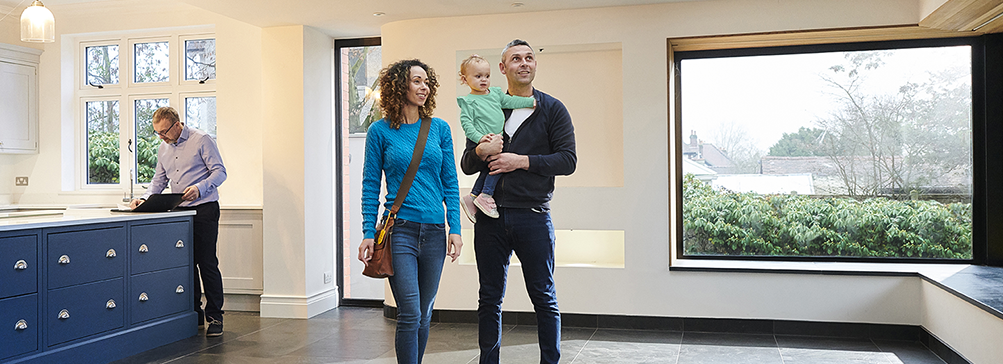Your offer was accepted on a home you really like! But don’t pop the cork just yet. As much as you want to celebrate, it’s time to get serious and focus on what comes next: the mortgage process. But every mortgage is different, and there are a lot of options to choose from and additional steps to take to finish the deal.
A good mortgage specialist will take the time to understand your wants, needs, and most importantly, your reality. You’ll want to get the mortgage product, features, and rate that work for you and learn ways to save along the way. If you haven’t researched the subject already, what follows can be a great start to learning everything you need to know about the mortgage process.
Get your financing for your application
Once you’ve agreed to buy a home, a purchase agreement is drawn and typically contains a good-faith deposit (“earnest money”) that you are willing to put in escrow to show your commitment to the seller.
“With a purchase agreement in hand, you can now go to your financial institution to get your mortgage formally approved,” says Janessa Berman, a Relationship Manager with Coast Capital. “Your lender will do their due diligence, which will include verifying your income and possibly appraising the value of the home you’ve just agreed to purchase.”
You usually have 45 to 60 days to fulfill your purchase agreement and apply for your mortgage. That’s not a lot of time for an involved application, so you need to move quickly on the next steps of verifying your income and assets, which requires extensive document gathering. This proof ensures your lender that you’ll be able to honour your loan payments over the life of the loan. Here are some of the documents and information you’ll need to provide:
- Employment verification: Name of current employer, phone number, street address; length of time there; position and title; and salary, including overtime and bonuses.
- Income verification: A recent paystub, T4s, and notices of assessment for the last two years. If you’re self-employed, you’ll need to be in business for a minimum of two years and provide Personal T1 Generals, Notices of Assessment, and Corporate Financial Statements (if applicable) for the two most recent years.
- Asset verification: List all bank accounts (savings, chequing, brokerage), other properties, investments (stocks, bonds, retirement account), proceeds from the sale of your current home, and funds that might be gifted from relatives.
- Debt verification: Note your current mortgage, liens, car loans, credit cards, etc…
- Property verification:An evaluation is needed to show the property is worth what you pay for it. Some lenders may just require an automated valuation model (AVM). In this instance, the lender doesn’t have to visit the property. In other cases, lenders may want a full appraisal.
At this point, you should think about hiring a real estate lawyer who can help you through the process as well as manage some of the paperwork and payments that are required for the home purchase.
Within three days of submitting your mortgage application, your lender sends you a loan estimate, which includes an approximate interest rate, what your monthly payment would be, and a list of your closing costs.
Choose the right type of mortgage for you
As you get closer to your closing day, you’ll need to choose your mortgage details. While this is a straightforward process, what you pick will affect your payments. The first thing you’ll want to decide is what kind of mortgage you want:
Fixed or variable: Fixed-rate mortgages offer rates and payment amounts that remain the same during the term of your mortgage. A variable rate mortgage has rates and payment amounts that may change during the life of the mortgage term, depending on changes in the lender’s prime rate.
“Fixed mortgages are appealing because the cost of your mortgage won’t change over the term. This makes it easier for new homeowners to budget,” says Berman. “With variable mortgages, if interest rates drop, you’ll pay less. However, if rates go up, you’ll pay more towards interest.”
It’s worth mentioning that some lenders, including Coast Capital, allow you to convert your variable rate mortgage to a fixed rate during the term of your loan. By going this route, you can take advantage of lower rates offered by a variable mortgage. But if mortgage rates start to climb, you can lock into a fixed rate.
Deciding between a fixed and variable mortgage is a personal decision, but make sure to talk to a Mortgage Advisor to understand the pros and cons.
Open or closed: An open mortgage allows the borrower to repay the mortgage in full at any time during the mortgage term (perhaps you know you’re coming into a windfall or may have to sell your home in the near term). Because of this flexibility, an open mortgage usually comes with a higher interest rate.
A closed mortgage limits the amount of money you can put toward your mortgage in addition to your regular mortgage payments. It tends to come with a lower mortgage rate because of this limitation.
Term or amortization: Your mortgage term can last between one and ten years, but most people go with five years. When that term is up, you will renew your mortgage at the current rates available.
How much you’ll pay every month is also determined by the amortization period. Most new home buyers will go with a 25-year schedule. However, some might go with 30 years as it would lower their monthly carrying costs. “This would give them some flexibility as they adjust to the costs associated with owning a home,” says Berman.
Decide on your payment options
When the money comes out of your account to pay your mortgage can be an important decision. For instance, you may want to align the withdrawal to your paycheck schedule or other factors that are better suited to your income. Certain choices can also pay your mortgage off sooner. Below are a variety of options:
- Monthly– Paid on the same day every month (12 payments per year).
- Bi-weekly– Your monthly payment is multiplied by 12 and then divided by 26 pay periods in a year (26 payments per year).
- Accelerated bi-weekly– Your monthly mortgage payment is divided by two, and that amount is withdrawn every two weeks (26 payments a year)
- Weekly– Your monthly payment is multiplied by 12 and then divided by 52 weeks in a year (52 payments per year).
- Accelerated weekly– Your monthly mortgage payment is divided by four, and that amount is withdrawn every week (52 payments a year).
“Monthly and bi-weekly payments are the most popular choices,” says Berman. “However, going with an accelerated bi-weekly schedule could be beneficial. Your monthly payment would increase slightly, but you’d shave years off your mortgage.”
It’s worth mentioning that you’re usually not locked into your payment options. Many lenders will allow you to change your payment schedule at least once a year. You may also be permitted to make prepayments which would further reduce how much you owe.
Be sure to read your mortgage contract to find out what the conditions are before you sign. You may also want to check out a mortgage calculator to see how extra payments will affect your budget.
Plan for the homestretch
Believe it or not, at this stage, you are still not approved for the loan. But with all the details out of the way, you can start counting down the days. What’s left? Nail-biting your way through the underwriting process to get to that closing.
Hopefully, you learned a little something about the steps that lead to a successful closing and feel more comfortable about what to expect along the way. If so, you might be unlocking the front door to your new home more quickly than you think.
Reach out to a Coast Capital Mortgage Advisor for more details on the homebuying process. To read about the final stage of your mortgage journey, see Guide for first-time homebuyers: Stage three—having a successful closing.



